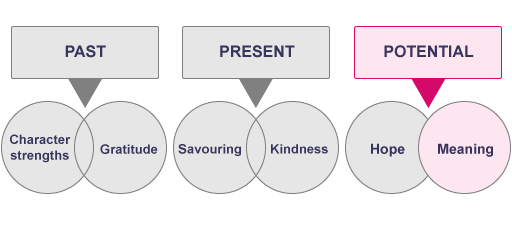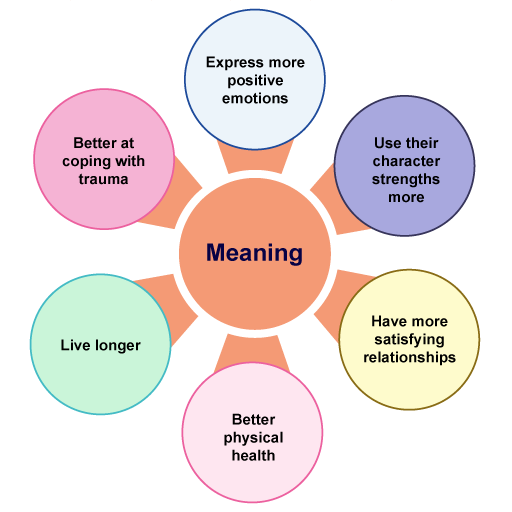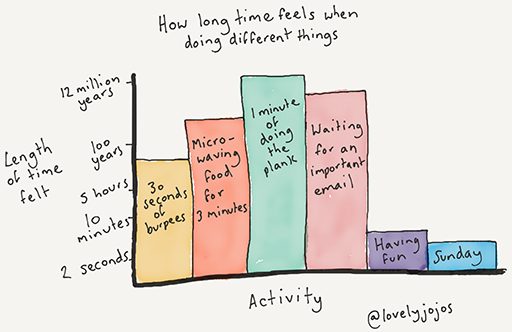Use 'Print preview' to check the number of pages and printer settings.
Print functionality varies between browsers.
Printable page generated Saturday, 22 November 2025, 3:55 PM
Unit 7: Meaning and purpose
The last of the six themes
Throughout this course you are introduced to some of the ways you can boost your happiness and wellbeing, and that of your children, using six key themes that have been shown to improve wellbeing through the way we think about the past, present and future potential.
The final theme is illustrated in the diagram below.
For this sixth and final theme, you are shown some practical activities that you can try at home. The benefits of these have all been supported scientifically and can be attempted by yourself during the course. They can also be adapted to work with children of all ages within the home. Being a good role model to our children is also a great way to help enhance their wellbeing.
 Mindful minute
Mindful minute
To start each unit, it is helpful to try to switch off from what has been happening in your day and greet your learning from a place of relaxation. The following exercise can be a way of doing this, so please feel free to try this. Alternatively, you may have your own way of switching off from the distractions of your day, like making a hot drink or putting on some calming music.
Sit in a comfortable position with your hands resting on your lap. Try to keep your back, neck and head straight and place both of your feet flat on the floor.
Bring your attention to your breath and consciously try to relax your shoulders. Imagine that the muscles in your shoulders are melting into your body and breathe deeply into your belly so that you can feel it expanding.
Press the button below which will set a timer for 1 minute. Close your eyes and continue to focus on your breathing and relaxing your shoulders. It is normal for your mind to wonder, and when this happens try to gently bring it back to your breathing and relaxing.
After a minute you will hear a buzzer. Open your eyes and continue with the course.
7.1 What is meaning and how can it help you and your family?
Having a sense of meaning and purpose in your life is considered to be a fundamental human need that can enhance wellbeing by bringing a multitude of positive mental and physical benefits.
For many people, especially as you enter adulthood, modern life can be a distraction from your deep-felt values and passions. It can be hard to remember what your purpose in life is when you are too busy trying to cope with getting through each day.
 Why having meaning and purpose in life is so important
Why having meaning and purpose in life is so important
During times of adversity, having a sense of meaning and purpose about your life has been shown to play an important role in coping with stress and trauma.
Research carried out during the pandemic found that meaning in life buffered against COVID-19-specific stress (Trzebiński et al., 2020), and general levels of boredom, depression, anxiety and stress (Chao et al., 2020).
Research has also shown that as well as having a protecting effect during challenging times, meaning also offers individuals a way to help them to discover what this is and grow during a time of crisis. This was illustrated by a COVID-19 study showing that despite spikes in acute stress, depression and anxiety among front-line healthcare workers, an astonishing 61% of them said they had found increased meaning and purpose in life (Shechter et al., 2020).
In this final unit, you will have the chance to pause and consider meaning and what values that you want to live your life by. As parents, by contemplating these questions, you can also help to guide your children to understand which of their strengths, dreams and passions can be nurtured to help them to find their own meaning in life.
In this video, Michelle discusses why having meaning and purpose in life is so important for you and the wellbeing of your family.

Transcript
 Meaning and purpose
Meaning and purpose
What do you think about these quotes? Do you agree with them?
Note your thoughts in the text box below.
7.2 The benefits for people who report higher levels of meaning
Being able to identify the meaning and purpose in your life and understand your ‘why’ serves as a point of reference for your future actions. It can help to provide clarity as you will be more focused on your goals and less likely to waste your time on futile endeavours.
 The meaning of life
The meaning of life
The following video gives a 60-second overview of what things can make life meaningful.
| 1. | Helping others |
| 2. | Making something better |
| 3. | Finding out how things work |
| 4. | Authentic connections with others. |
Can you think of any meaningful examples in your own life where you address these four elements?
Note your thoughts in the text box below.
Finding meaning in the pandemic
Whilst facing the pandemic and its effects on the world, your life, your relationships and your future, it can be easy to view it as a purely negative set of events.
Positive psychology would encourage us, where possible and with support, to look out for any signs of growth and try to facilitate this. This is known as posttraumatic growth, and may involve recognition of personal strengths, improved relationships and a greater appreciation of life.
Perhaps you are able to recognise some signs of personal growth in your life when you compare your life now to before the pandemic?
7.3 How to use meaning with your family to enhance wellbeing
The following activities may offer some strategies to help you and your family to find meaning and purpose in your lives.
 Questions to help you find your ‘why’
Questions to help you find your ‘why’
7.4 Creating a meaningful ritual for your family
Many families have traditions and ways of doing things that are meaningful to them.
You may follow particular traditions on birthdays and holidays as well as daily rituals, such as waking up your partner with a drink or reading a story to your children before bed.
These traditions can help to build connections between family members and enhance relationships.
 Traditions and daily rituals
Traditions and daily rituals
7.5 Finding your flow as a family
 Times flies when you are having fun!
Times flies when you are having fun!
Identify favourite activities that family members love to participate in where they are totally engrossed and lose track of time – experiencing ‘flow’.
This might be exercising, baking, reading, playing a game, making crafts, playing an instrument, performing a dance, listening to music, creating art, etc.
Try to find regular times in your week when you can all participate in these activities. By increasing the frequency and intensity of your flow experiences, you will feel more connected to your life and what you value, increasing your wellbeing.
Finding your ‘ikigai’
The Japanese use the term ‘ikigai’, which can be translated to mean your ‘reason for being’. This covers anything that makes your life feel worthwhile.
In the Western definition of ikigai, the term can be broken down into four spheres: what you love, what you’re good at, what the world needs and what you can be paid for. Where all four spheres overlap, you find your ikigai.
The Japanese have a number of 'rules' to uncover your ikigai. These include living for the moment, doing gentle daily exercise, staying in touch with friends and family, and connecting with nature.
7.6 Best possible self-exercise
The next activity has been shown to have positive effects on mood and outlook on life, and the effect may last as long as a week (Meevissen, 2011).
You can try different versions of the exercise, visualising your best possible self in different aspects of your life.
 Positive effects on mood and outlook on life
Positive effects on mood and outlook on life
7.7 Summary
In this unit you learned that having a sense of meaning and purpose can offer many benefits to help to boost your wellbeing.
You have attempted to identify the meaning and purpose in your life and explored how you can encourage your family to be able to recognise their own meaning and purpose.
 Further resources
Further resources
Frankl, V. E. (1963). Man’s Search for Meaning. New York: Washington Square Press. |
Stager, M. (2007). The untethered soul: The Journey Beyond Yourself. Oakland, CA: New Harbinger. |
Now go to Unit 8: Conclusion, where we review the course.
References
Cohen, R., Bavishi, C. & Rozanski, A. (2016) 'Purpose in life and its relationship to all-cause mortality and cardiovascular events: A meta-analysis', Psychosomatic Medicine, 78(2), 122–133.
Meevissen, Y.M., Peters, M.L. & Alberts, H.J. (2011) 'Become more optimistic by imagining a best possible self: Effects of a two week intervention', Journal of Behavior Therapy and Experimental Psychiatry, 42(3), 371-378.
Park, C.L. (2010) 'Making sense of the meaning literature: An integrative review of meaning making and its effects on adjustment to stressful life events', Psychological Bulletin, 136(2), 257–301. https://doi.org/10.1037/a0018301.
Roepke, A.M., Jayawickreme, E. & Riffle, O.M. (2014) 'Meaning and health: A systematic review', Applied Research in Quality of Life, 9(4), 1055–1079.
Steger, M.F. (2012) 'Experiencing meaning in life: Optimal functioning at the nexus of spirituality, psychopathology, and well-being', In P.T.P. Wong (Ed.), The human quest for meaning, 2nd ed., pp. 165–184, Routledge.





